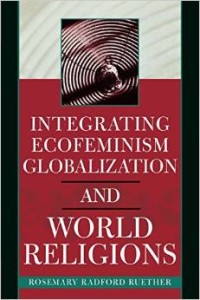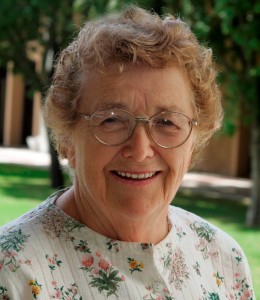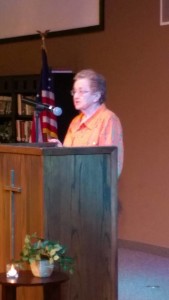Spirituality, Ecology, & Feminism Conference, with Guest Speaker Dr. Rosemary Radford Ruether; Canonization of Rachel Carson by Church in the Cliff; Ordination of Everyone by New Wineskins Community
It seems more than coincidental that I attended a conference on ecology and feminism the Saturday after Pope Francis addressed Congress. As I listened to his address, I resonated with so much of what he said about eliminating poverty and about caring for the environment. I also felt a dissonance because he never mentioned overpopulation as part of our environmental crisis, nor did he mention the connection between abuse of the earth and abuse of women, nor that poor women suffer disproportionately from environmental disasters, nor that discrimination against women, including that in the church, is responsible for the fact that 70% of the poor are women. But then on Saturday I had the privilege of hearing theologian Rosemary Radford Ruether speak on “Spirituality, Ecology, & Feminism” at a conference sponsored by The Open Window, a wonderful progressive Roman Catholic group in Dallas affiliated with the national Call to Action organization. She filled in the glaring gaps in Pope Francis’ statements on the environment and articulated a comprehensive theological and ethical foundation for our environmental activism. I sat there thinking that she should be the one to address Congress and the UN! She should be the one to have an international platform, but without being the Pope because she believes in an egalitarian, not a hierarchical, church.
Dr. Ruether explained that ecofeminism emerged in the late 20th century as a major school of theological thought and social analysis. Ecofeminism illuminates the connections between the oppression of women and the oppression of the earth. The word “ecofeminism” was coined in 1972 by Francoise d’Eaubonne, who stated that “the destruction of the planet is due to the profit motive inherent in male power.” d’Eaubonne’s book Le Féminisme ou la mort (Feminism or Death) saw women as central to bringing about an ecological revolution. It seems that Pope Francis doesn’t see women as central to anything except the family.
 Quoting from her book Integrating Ecofeminism, Globalization, and World Religions, Dr. Ruether said: “Ecofeminism sees an interconnection between the domination of women and the domination of nature. This interconnection is typically made on two levels: ideological-cultural and socioeconomic. On the ideological-cultural level women are said to be “closer to nature” than men, more aligned with body, matter, emotions, and the animal world. On the socio-economic level, women are located in the spheres of reproduction, child raising, food preparation, spinning and weaving, cleaning of clothes and houses, that are devalued in relation to the public sphere of male power and culture. Claiming that women are ‘naturally’ closer to the material world and lack the capacity for intellectual and leadership roles justifies locating them in the devalued sphere of material work.”
Quoting from her book Integrating Ecofeminism, Globalization, and World Religions, Dr. Ruether said: “Ecofeminism sees an interconnection between the domination of women and the domination of nature. This interconnection is typically made on two levels: ideological-cultural and socioeconomic. On the ideological-cultural level women are said to be “closer to nature” than men, more aligned with body, matter, emotions, and the animal world. On the socio-economic level, women are located in the spheres of reproduction, child raising, food preparation, spinning and weaving, cleaning of clothes and houses, that are devalued in relation to the public sphere of male power and culture. Claiming that women are ‘naturally’ closer to the material world and lack the capacity for intellectual and leadership roles justifies locating them in the devalued sphere of material work.”
She extended this analysis from gender to class, race, and ethnic hierarchies: “Devalued classes and races of men and women are likewise said to lack capacity for intellect and leadership, located socially in the spheres of physical labor in households, farms, and workshops. The fruits of this labor, like that of wives in the family, are appropriated by the male elites as the base for their wealth and freedom to exercise roles of power. The structures of domination that oppress people according to gender, race, and class join to oppress nature also.”
Ecofeminists envision a transformation of this deeply rooted ideology and social system. They reject an essentializing of women as more in tune with nature. Women may, however, suffer more from the abuse of the natural world and also become more aware of this abuse of nature. Ecofeminists call for mobilization to bring change. Social hierarchies of men over women, white elites over subordinated classes and races need to be transformed to egalitarian societies which recognize the full humanity of each person. Greater racial and gender equality needs to go beyond mere tokenism which doesn’t change the deep hierarchies of wealth and power of the few over the many; there must be a major restructuring of the relations of human groups to each other and a transformation of the relation between humans and the nonhuman world.
Dr. Ruether highlighted the work of the leading Latin American ecofeminist theologian, Ivone Gebara, who observes in her book Intuiciones Ecofeministas (Ecofeminist Intuitions) that poor women are the ones who primarily have to cope with the problems of air pollution, poverty, poor quality of food, and lack of clean drinking water. These ecological problems create health problems for themselves and their children for which they are primarily responsible. In his statements on the poor and the environment Pope Francis never acknowledges that these problems fall most heavily on women. Gebara does something else the Pope doesn’t: she challenges the dominance of male theological symbols, and she proposes female symbols for God, such as Wisdom. She sees ecofeminism as deconstructing patriarachal theology with its hierarchical structure and methodology, dismantling the whole paradigm of male over female, mind over body, heaven over earth, transcendent over immanent, the male God outside of and ruling over the created world. Ecofeminist theology starts with experience, especially the embodied experiences of women in daily life, and understands the human person in a network of relationships, not as an autonomous self, recognizing our interrelations with the whole cosmos. Ecofeminists urge us to dismantle those systems that allow some few humans to flourish inordinately at the expense of most other humans and the earth, and they challenge us to shape egalitarian societies.
Turning to the Pope’s Encyclical on the Environment, Dr. Ruether first focused on the strong points. She expressed her appreciation for his scientific background, evident in some of the details of the encyclical. She commended the Pope for emphasizing that human sinfulness is the primary cause of climate change, for connecting poverty and abuse of the earth, for challenging everyone to address this abuse of our common home, for stating the need to create a new culture based on the doctrine of the goodness of creation, for including all creation in his theology of resurrection, for his theology of all creation as incarnational with God present in all, and for calling on all religions to dialogue with one another about the care of creation. She expressed her hopes that the encyclical will make a difference because it’s being widely read by people from many religions. The first question raised by a conference attendee was why the encyclical doesn’t address the connection between overpopulation and our environmental crisis. Dr. Ruether answered by noting 2 big blind spots of Pope Francis: (1) he doesn’t see the need for population control and doesn’t believe in birth control; (2) he doesn’t mention women—the connection between abuse of women and abuse of the environment, the fact that poor women suffer most from environmental disasters, the fact that gender inequality, including in the church, results in 70% of the poor being women. “It’s like we don’t exist,” she said. “The Pope doesn’t think about women; he lives in an all-male world, and he can’t understand the context of women.” Another conference attendee voiced her concern that the Pope’s encyclical also fails to mention that raising animals for consumption contributes to the destruction of the environment.
It seems more than coincidental that the Sunday following this conference, while the Pope was in Philadelphia before a crowd of hundreds of thousands, I was with one of my faith communities, Church in the Cliff, as we canonized environmental activist Rachel Carson, and the following Sunday I was with my other faith community, New Wineskins, as we ordained everyone.
 Without sanction from the Pope or any religious hierarchy, Church in the Cliff canonized Rachel Carson, author of the ground-breaking book Silent Spring, first published in 1962, igniting the environmental movement. In the weeks leading up to All Saints’ Day, our community chooses people we admire to canonize. One of our members, David Marquis, began the canonization by connecting the work of Rachel Carson to environmental problems in Dallas during her day, especially in the poorest Dallas neighborhoods. He also talked about her teaching the connection of all social justice issues to environmental issues, illuminating how we’re all part of the ecosystem. Scott Shirley, pastor of Church in the Cliff, continued the canonization of Rachel Carson by telling more of her remarkable story and lauding her for teaching that we are all a part of the interconnectedness of nature, for her sense of wonder in nature and her challenge to cultivate this sense of wonder in children, and for her bearing witness to caring for our environment.
Without sanction from the Pope or any religious hierarchy, Church in the Cliff canonized Rachel Carson, author of the ground-breaking book Silent Spring, first published in 1962, igniting the environmental movement. In the weeks leading up to All Saints’ Day, our community chooses people we admire to canonize. One of our members, David Marquis, began the canonization by connecting the work of Rachel Carson to environmental problems in Dallas during her day, especially in the poorest Dallas neighborhoods. He also talked about her teaching the connection of all social justice issues to environmental issues, illuminating how we’re all part of the ecosystem. Scott Shirley, pastor of Church in the Cliff, continued the canonization of Rachel Carson by telling more of her remarkable story and lauding her for teaching that we are all a part of the interconnectedness of nature, for her sense of wonder in nature and her challenge to cultivate this sense of wonder in children, and for her bearing witness to caring for our environment.
Without authorization from the Pope or any religious hierarchy, New Wineskins Feminist Ritual Community ordained everyone to symbolize our shared power and the equality of all in our community. We believe that every voice and all gifts have equal value, so we blessed the gifts of everyone. New Wineskins Community explores new ways of seeing divinity so that the spiritual gifts of everyone are equally valued and nurtured. New Wineskins Community offers rituals especially focused on the Divine Feminine, to change culture from devaluation to empowerment of the feminine. The rituals also symbolize shared power and responsibility to change culture from one up/one down and win/lose to mutual relationships. The mission of New Wineskins is to expand experience of Divine Mystery and to contribute to healing, peace, and justice in our world. The name “New Wineskins,” coming from the metaphor in Matthew 9:17, describes our search for new language and symbols to proclaim the good news of liberation and shalom. Our rituals name and image the Divine as female and male and more to support the equality and value of all. New Wineskins Community welcomes people of all faiths, races, sexual orientations, ages. We celebrate diversity and actively encourage the discovery and exercise of everyone’s gifts.
Many people have referred to Pope Francis as the leading “moral authority” in the world today. Rosemary Radford Ruether, with her more comprehensive, inclusive work on the environment and other social justice issues, stands out as a better “moral authority.” But instead of looking to Pope Francis or to Dr. Ruether or to anyone else as our “moral authority,” may we all find that “moral authority” within ourselves. Sophia Wisdom lives within us all!
She lives, She lives! Sophia lives today;
She lives and works throughout the world to show the peaceful way.
She lives, She lives! We hear Her urgent call;
we work with Her to change the world; She lives within us all.
© 2014 Jann Aldredge-Clanton. From Earth Transformed with Music! Inclusive Songs for Worship (EakinPress, 2015).

